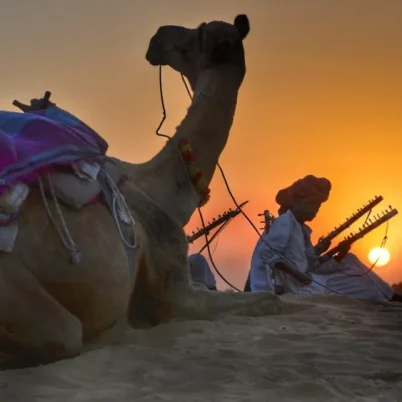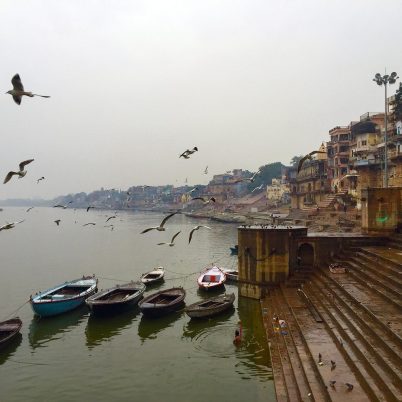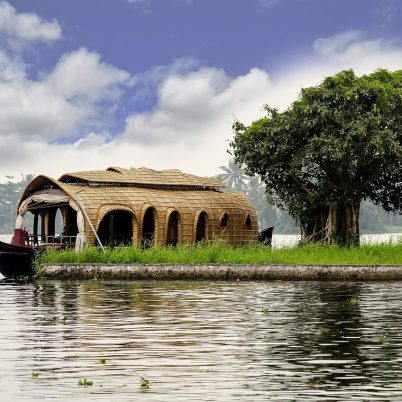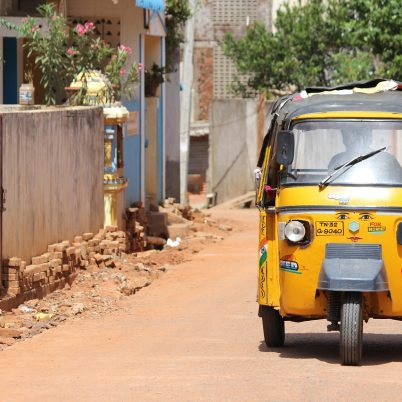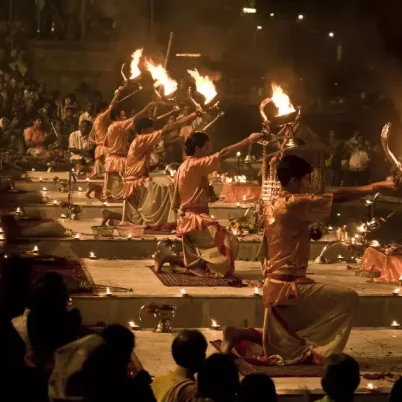
The state of Gujarat in India is a treasure trove of culture, traditions, architecture, and history, but not many people know that you can find some of the best wildlife sanctuaries for birding in Gujarat! Yes, Gujarat, abundant in wildlife, is home to a diverse range of flora and fauna, and is a paradise for nature lovers, wildlife enthusiasts, and avid bird watchers. So if you are a birding enthusiast, read on to find the 10 best wildlife sanctuaries for birding in Gujarat.
1. Thol Lake Sanctuary
Thol Lake Sanctuary is an open water sanctuary with cropland, fallow land, and scrub land surrounding it. Around 30 kilometers away from Ahmedabad city, the site was declared a Ramsar Site. The shallow freshwater lake is dependent on rainwater. There is a walking trail around the lake where there are viewing points for bird enthusiasts to spot birds.
The sanctuary is inhabited by 150 species of birds. Around 60 percent of those species are water birds. During winters, you can see the lake turn pink with the number of flamingos that flock the sanctuary. Apart from flamingos, you can also spot the Sarus Crane – the world’s tallest flying bird, Great White Pelicans, brahminy starlings, green bee eater, black rumped flameback, spotted owlets, shikra, and many waterfowl such as mallards, geese, and waders.
The best time to visit Thol Lake Sanctuary is during winter, especially the months of January and February.
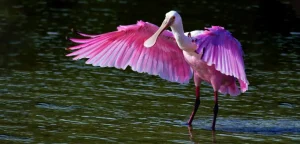 Thol Lake Sanctuary
Thol Lake Sanctuary
2. Velavadar National Park
Around 3 hours from the Ahmedabad airport is Velavadar National Park, primarily known for the large herds of blackbucks that reside here. However, the national park is also a great place for birding enthusiasts to spot many different species of birds. The park is home to over 140 species of birds such as Chestnut-bellied and Spotted Sandgrouse, Painted Francolin, Sirkeer Malkoha, Red-rumped Swallows, different types of larks like Rufous Tailed, Syke’s, Desert, and Variable Wheateaters.
You can also spot raptors like Montagu, Marsh and Palid Harriers, accipiters like Shikra, Common Kestrel, Eurasian Hobby, Laggar, Peregrine, and Red-necked Falcon, Eurasian Sparrow Hawk and the rare Norther Goshawk. There are also many species of eagles such as the Short Toed Snake Eagle, Steppe Eagle, Eastern Imperial Eagle, Tawny Eagle, and the Greater and Lesser Spotted Eagle.
Velavadar National Park is also home to animals like the jungle cat, golden jackal, Indian fox, and the Indian grey wolf. The best time to visit the park is from October to December and January to May.
See also: Best wildlife sanctuaries in Gujarat
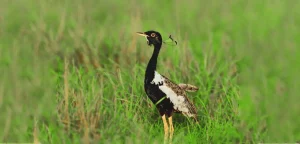 Velavadar National Park
Velavadar National Park
3. Sasan Gir National Park
Gir National Park is the only place in the world outside Africa where you can spot the lion in its natural habitat. It is renowned all over the world for the largest population of the Asiatic lion in India. However, it is also a paradise for birdwatchers, with more than 300 species of resident as well as migratory birds, which include the crested serpent eagle, crested hawk eagle, brown fish owl, Indian eagle owl, rock bush quail, Indian peafowl, brown-capped pygmy woodpecker, black-headed oriole, crested treeswift, Indian pitta, and more. If you look dedicatedly, you may also be able to spot the Malabar whistling thrush and the endangered Bonelli’s eagle.
The best time to visit Sasan Gir National Park for birdwatching is from December to March.
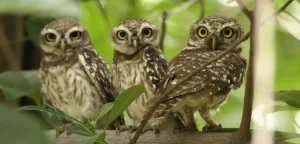 Sasan Gir National Park
Sasan Gir National Park
4. Khijadiya Bird Sanctuary
The Khijadiya Bird Sanctuary is situated 10 kilometers from Jamnagar, and includes three freshwater lakes. It is a nesting zone for many rare species of birds that cannot be found anywhere else in the Indian peninsula. It is home to almost 200 species of birds, including more than 90 species of waterfowl. The park is renowned for the Indian Skimmer, but some species you should look out for are Great-crested Grebe, Baer’s Pochard, Black-necked Stork, and Caspian Tern.
You can also spot little grebe, purple moorhen, coots, black-winged stilt, and pheasant-tailed jacana, along with resident birds like painted stork, cormorants, herons, egrets, and ibises. There are waterfowl such as ducks, geese, coots, grebes, terns, gulls, kingfishers, jacanas, and rails, as well as raptors such as harriers, eagles, hawks and falcons. The sanctuary is also a breeding nest for the Great Crested Grebe.
The best time to plan your trip here is from November to February.
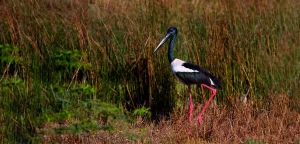 Khijadiya Bird Sanctuary
Khijadiya Bird Sanctuary
5. Little Rann of Kutch
The Little Rann of Kutch is an expansive land of salt flats, looking barren and empty at first glance. However, the area is brimming with wildlife. The region attracts many migratory birds such as the lesser flamingos, greater flamingos, demoiselle cranes, and pelicans. The place also has raptors, wheateaters and larks.
You will also be able to spot the yellow wattled lapwing, the sociable lapwing, the Indian courser, white-eyed buzzards and common buzzards, chestnut bellied sandgrouse, booted eagles, and the elusive MacQueens’ bustard. Little Rann of Kutch is the largest breeding ground of the Lesser Flamingo in India.
You can explore the avian population on foot or by a jeep safari. A walk through the region will help you spot the smaller birds along with the desert flora unique to the region. You can also opt for a local jeep safari, wherein you can scout a wider area and spot large birds of prey flying above. A local guide can be helpful to learn in depth about the birds of the region.
November to February is ideal for birdwatching in the Little Rann of Kutch. October to December is also the breeding season for the Indian Wild Ass.
Read more: Best places to visit in Gujarat
 Little Rann of Kutch (Picture credits: Bhavna Resort and Farm)
Little Rann of Kutch (Picture credits: Bhavna Resort and Farm)
6. Nalsarovar Bird Sanctuary
Nal Sarovar Bird Sanctuary is the largest wetland bird sanctuary in Gujarat, and one of the 15 important wetlands of India. It is home to around 250 species of birds, and it is quite common for a birdwatcher to get 100 sightings in one day!
The sanctuary is named after the lake in the region, and is best explored by a boat ride. The lake is shallow, with lagoons highlighted by 360 islets.
You will be able to spot flamingos, pelicans, storks, herons, coots, bitterns, crakes, grebes, egrets, geese, cormorants, and brahminy ducks. Waterfowls and cranes can be seen in flocks. The lake has one of the highest populations of waterfowl in India. Visit Nalsarovar Lake from October to February for maximum bird sightings.
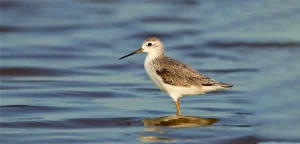 Nalsarovar Bird Sanctuary
Nalsarovar Bird Sanctuary
7. Porbandar Bird Sanctuary
One kilometer away from Porbandar Railway Station is the Porbandar Bird Sanctuary, one of the smallest bird sanctuaries in India. It was declared a sanctuary in 1988, and in 1990, it came under the possession of the Forest Department. It is the only bird sanctuary in Gujarat to provide legal protection to the birds sheltered there. This is the only bird sanctuary in India where humans and nature co-exist.
The sanctuary is a conservatory for around 150 species of birds, both resident and migratory. You can spot flamingos, grebes, pelicans, ducks, geese, avocets, coots, cormorants, herons, egrets, bittern, storks, ibis, spoonbill, cranes, whistling teals, gulls, terns, jacanas ruff, red shanks, Indian roller, and many other types of birds.
The ideal time to visit the sanctuary is during winters, when there is a surge of thousands of vibrant migratory birds.
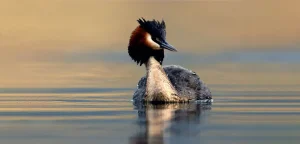 Porbandar Bird Sanctuary
Porbandar Bird Sanctuary
8. Kutch Desert Wildlife Sanctuary
The Kutch Desert Wildlife Sanctuary is the largest sanctuary in Gujarat, special for more reasons than one. The buried city of Harappan civilization, Dholavira, was excavated in this region. Archaeologists and history buffs from all over the world gather here to see this ancient attraction. The sanctuary is also home to Flamingo City, located in the flats of Rann. this place is the only area where flamingos nest and breed. Additionally, this sanctuary has records of fossils of dinosaurs, crocodiles, and whales recovered here.
Besides flamingos, you can spot many local and migratory birds here, including raptors, Houbara bustard, white pelicans, avocets, painted sandgrouse, larks, steppe eagles, and many types of waterfowls.
The ideal time to visit the sanctuary is winter or just after monsoons.
See more: Best time to visit Gujarat
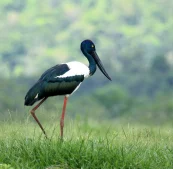 Kutch Desert Wildlife Sanctuary
Kutch Desert Wildlife Sanctuary
9. Marine National Park
Located in Jamnagar district in Gujarat, Marine National Park is the first marine wildlife sanctuary and national park in India. The park is an archipelago of 42 islands such as Karubhar, Pirotan, Narara, and Poshitra, and is home to a vibrant marine life, including stunning corals, sponges, sea turtles, and other fishes. It is also a great place for birdwatching.
The park has around 80 species of birds. You can spot birds declared as threatened species like the great Indian bustard, painted stork, darter, and black-necked ibis in large numbers. There are also many other birds like gulls, terns, marsh harriers, herons, spoonbills, ducks, egrets, little cormorants, teens, Pallas’ fish eagle, and osprey kingfisher.
October to March are the ideal months for visiting Marine National Park. it gets very hot during summers, from March to May, while the region becomes muddy during monsoons from June to August.
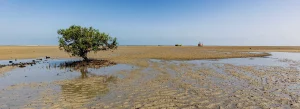 Marine National Park
Marine National Park
10. Great Indian Bustard Sanctuary
The Great Indian Bustard Sanctuary, as the name suggests, is home to the endangered Great Indian Bustard, one of the largest flying birds in the world. Located near Naliya in Kutch district, this sanctuary is also home to many other species of birds, such as harriers, eagles, and vultures.
Apart from these birds, you can also spot mammals like wolves, foxes, and hyenas during jeep safaris through the sanctuary. The best time to visit the sanctuary is between November and March.
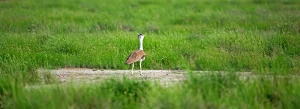 Great Indian Bustard Sanctuary
Great Indian Bustard Sanctuary
Would you like to go on a birding trip to Gujarat in India? At India Someday, we curate trips based on your requirements and expectations. Contact us, and we will plan the perfect birding and wildlife trip for you in India!
Frequently Asked Questions
Velavadar Bird Sanctuary is most famous for the Indian Blackbuck, found in large numbers here.
The Great Indian Bustard is the largest bird of India, growing up to 1 meter in height and weighing up to 15 kgs.
The Greater Flamingo is the state bird of Gujarat. The Kutch Desert Wildlife Sanctuary is renowned for its Flamingo City, where these birds actually nest and breed.
The Nal Sarovar Bird Sanctuary is the largest bird sanctuary in Gujarat, covering an area of 120.82 square kilometers.
helping you travel your way
Everything you need to know about India is here We have tried writing about everything you may need help with for your trip to India, If you need help in planning a trip to India Get in touch with us to to plan your trip of a life time.



